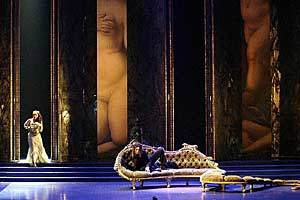L'Incoronazione di Poppea - Claudio Monteverdi

Last Thursday I went to la Monnaie to see l’Incoronazione in three acts. It started at 7:00pm till 11:00pm. This is one of the very first operas written when Monteverdi made the transition between the Renaissance and the Baroque music. After serving at the court of the duke of Mantova as music master and composing Orfeo and Arianna he was appointed as maestro di cappella in Venice where he worked there for 30 years. In Venice he composed all kind of music but only at the end of his life, at the age of 75 he composed Il Ritorno di Ulisse in Patria in 1640, Le Nozze di Enea and Lavinia in 1641 and l’Incoronazione di Poppea in 1642. Monteverdi died in 1643.
L’Incoronazione was for a long time a mythical opera. The music of this last opera was lost until two very different versions were found: one in Venice in 1888 and one in Naples in 1930. So every performance of this opera is really the version of the music director. Parts are added or cut as they wish.
This is the first time I see this opera so I cannot judge against others. All I can say is that I loved it. The setting is modern and timeless at the same time. The orchestra with period instruments created a baroque environment where the singers could perform the very special “parlar cantando” and “cantar parlando” that characterized Monteverdi operas.
Some knowledge of Roman history is recommended. It helps understand the mood of passion and perversion. Nerone, Poppea, Ottavia and Ottone all come alive. Seduced by Poppea, Nerone wants to repudiate Ottavia to proclaim Poppea empress. Poppea more interested in the throne than by Nerone, convinces Nerone to condemn Seneca, his counselor, to death. Ottavia persuades Ottone to kill Poppea with the help of Drusilla, in love with him. The plot is discovered and Ottone, Drusilla and Ottavia are exiled. Nerone crowns Poppea empress.
This is the most ambiguous “lieto fine” in the history of Opera, where the criminal lovers triumph in the end singing the famous due d’amore Pur ti miro…
opera music
Monteverdi
Brussels
Monnaie




0 Comments:
Post a Comment
<< Home